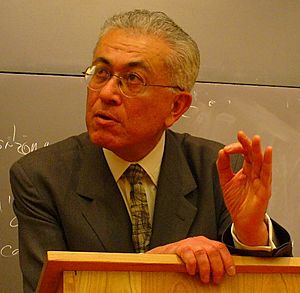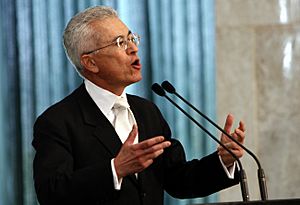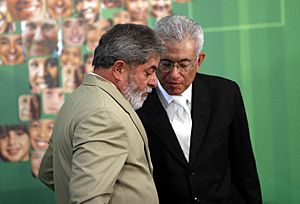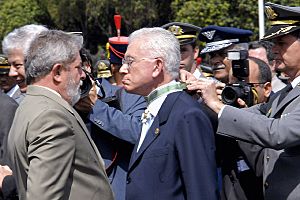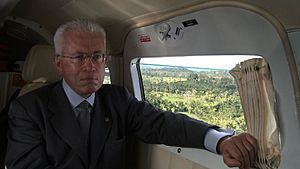Roberto Mangabeira Unger facts for kids
Quick facts for kids
Roberto Mangabeira Unger
|
|
|---|---|
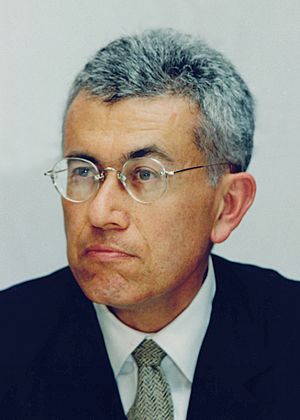 |
|
| Born | March 24, 1947 |
| Education | Federal University of Rio de Janeiro (BA) Harvard University (LLM, SJD) |
| Era | 20th-/21st-century philosophy |
| Region | Western philosophy |
| School | Radical pragmatism |
| Institutions | Harvard University |
|
Main interests
|
Social theory · Legal theory · Economics · Political philosophy · Natural philosophy |
|
Notable ideas
|
False necessity · formative context · negative capability · empowered democracy · radical pragmatism · transformative vocation · institutional alternatives |
Roberto Mangabeira Unger is a Brazilian thinker and politician. He was born on March 24, 1947. His work combines ideas from philosophy, law, and social studies. He is known for his ideas on how society can be changed and improved.
Unger believes that people are much more capable than the situations they are born into. He thinks that each person has the power to live a better life. He also believes that the way our society is set up, including things like property rules or how governments work, is not fixed. Instead, he says these are things we created and can change.
He suggests that things like markets and governments should be open to new ideas. They should be flexible so we can try different ways to help people and groups become stronger. This, he believes, will lead to more freedom for everyone.
Unger has also been very active in Brazilian politics. He helped start a political party and worked on presidential campaigns. He even served as Brazil's Minister of Strategic Affairs twice.
About Roberto Unger
His Family Background
Roberto Unger's grandfather, Octávio Mangabeira, was an important politician in Brazil. He served as a minister and later as a governor. He faced challenges like imprisonment and exile during a time of dictatorship in Brazil.
Unger's parents were also very smart. His father, Artur Unger, was from Germany. His mother, Edyla Mangabeira, was a Brazilian poet and journalist. They met in the United States while his grandfather was in exile.
Growing Up and School
Roberto Mangabeira Unger was born in Rio de Janeiro, Brazil, in 1947. He spent some of his childhood in New York City. When he was eleven, his father passed away, and his family moved back to Brazil.
He went to a Jesuit school and then studied law at the Federal University of Rio de Janeiro. Later, he went to Harvard Law School in the United States. By the age of 29, he became one of the youngest professors to get a permanent teaching position there.
His Work at Harvard
Unger's academic career began with his books Knowledge and Politics and Law in Modern Society. These books helped start a movement called Critical Legal Studies (CLS). This group questioned the usual ways of thinking about law in American universities.
Unger spent many years writing a big work called Politics: A Work in Constructive Social Theory. This three-volume series explored how societies work and suggested new ways to organize them. He argued that society is something we create, not something that has to be a certain way. He believed that there isn't a fixed path for how societies develop, like from feudalism to capitalism. Instead, he said we can change things step by step.
He continued to write books that offered ideas for how to change society and politics. These included What Should Legal Analysis Become?, Democracy Realized: The Progressive Alternative, and What Should the Left Propose?.
Unger's Main Ideas
How Society Works
Unger's ideas about society are based on the belief that we can always change and improve how we live together. He thinks that past thinkers sometimes believed society had to follow certain rules, but Unger says we can always imagine and build something new.
He believes that society changes through conflicts and struggles over resources and power. The winners of these struggles often set up rules and institutions, which Unger calls a formative context. People then start to believe these arrangements are necessary, which he calls false necessity. But Unger argues these arrangements are not fixed and can always be challenged and changed. This ability to resist and change is what he calls negative capability.
Unger suggests that big changes happen little by little, through people's efforts and new ideas. He proposes a concept called Empowered democracy. This is his idea for creating more open and flexible social systems. These systems would allow individuals and groups to suggest changes and work to transform society, the economy, and politics.
In this system, political parties would have the power to try out new ideas quickly. Local communities would also get help to start new businesses and encourage new inventions. People would have rights to economic security and also the power to challenge unfair rules.
Ideas About Law
Unger's work on law aims to show that legal systems are not natural but are created by people. He asks why modern societies have specific legal institutions, like courts and legislatures, and why lawyers have a special way of thinking. He argues that these legal systems developed over time, not because they were absolutely necessary for things like property rights.
His ideas were important to the Critical Legal Studies movement. This group of legal scholars questioned the traditional ways of thinking about law. Unger offered a new way forward: to rethink rights based on individual freedom and power. He also suggested creating flexible legal structures that could be constantly updated to give more people better educational and economic chances.
Ideas About the Economy
Unger believes we can rethink and rebuild how our economies work. He argues that economic systems don't have a natural or fixed form. He challenges the idea that there's only one way to organize markets and work.
He suggests that economics should not be separated from ideas about people and society. He wants to bring back the idea of classical economics, which looked at how social activities relate to wealth. But he wants to remove the idea that there's only one necessary way for things to be.
In his book Free Trade Reimagined: The World Division of Labor and the Method of Economics, he shares ideas for thinking about economic activity:
- Specialization and Discovery: He says that too much competition can stop people from inventing new things, especially when trading partners are unequal.
- Politics and Economics: He believes that strict government control can limit new ideas and solutions.
- Free Trade: He thinks free trade should help countries experiment and innovate, not just cut costs. The best trade rules are those that allow the most freedom.
- Different Markets: Since markets can be organized in many ways, he believes global trade can also be organized differently.
- Work Organization: He suggests that work should be about learning and constant invention, not just like a machine.
- Mind and Context: He says our minds are always trying to go beyond what's expected, so our systems should allow for constant change.
Unger proposes that the economy should not just create wealth but also encourage new ideas and discoveries. He wants to see different types of property rights existing together in the same market system. He also emphasizes the free movement of people around the world, rather than just capital.
Unger's Political Work
Unger has been involved in Brazilian politics for a long time. He worked against the military dictatorship in the 1970s and 80s. He helped write the first plans for the Brazilian Democratic Movement Party (PMDB) in 1980.
He believes that society can always be changed and rebuilt. He doesn't think there's one single group that will bring about change. Instead, he sees change happening step by step, where different parts of society can be replaced one at a time. He wants to build a system where change is always possible.
Early Political Activities
Unger started his political work in Brazil in the late 1970s as the country became more democratic. He joined the main opposition party and helped develop their ideas. He also helped create the Brazilian Democratic Movement Party (PMDB) and wrote its first official statement.
Later, he joined the Democratic Labour Party (PDT) and worked with its leader, Leonel Brizola. He helped Brizola travel the country, recruit members, and develop political ideas. In 1983, he led a state foundation for homeless children, where he made big changes like helping children get adopted and supporting families in poor areas.
Political Campaigns
In 1990, Unger ran for a seat in the national parliament. He didn't have much money or staff, but he still got many votes from middle-class people, even though he campaigned mostly in poor neighborhoods. This experience made him believe that the political system was more open to change than he thought.
He also helped organize the presidential campaigns for Leonel Brizola in 1989 and 1994, and for Ciro Gomes in 1998 and 2002. In 2000, he tried to run for mayor of São Paulo, but the party stopped the election when it looked like he would win. He also considered running for president in 2006.
As Minister of Strategic Affairs
In 2007, Roberto Unger was appointed as the Minister of Strategic Affairs by President Lula. In this role, he tried to put his ideas into action. He wanted to help small businesses grow by providing them with more credit and support. He also pushed for ways to give more people access to technology and for the government to help civil society groups provide social services.
Some of his specific projects included:
- Education: He worked to change secondary education to focus on problem-solving and conceptual skills, not just job-specific training.
- Labor Laws: He helped write new laws to protect temporary workers and those in the informal economy.
- Amazon Development: He created a plan for the Amazon region that would protect the environment and help local people. He helped pass a law that gave legal titles to small farmers living on untitled land. This encouraged them to protect the land because they owned it.
Unger served as minister for two years, leaving in 2009 to return to Harvard. He later said he left for personal and political reasons.
Work Outside Brazil
Unger has also worked on global issues. In the late 1990s, he helped create the Latin American Alternative. This group of politicians and business leaders wanted to find new ways for countries to develop, different from the usual economic models. They suggested ideas like guaranteeing social rights (like education and jobs) for everyone and breaking up big media companies. Their ideas were put into a document called the "Buenos Aires Consensus" in 1997.
This agreement was officially signed in 2003 by leaders from Argentina and Brazil, and other Latin American countries.
Current Activities
More recently, Unger has focused his political work on the state of Rondônia in northwestern Brazil. He believes this state has the potential to be a leader in a new way of development for Brazil. He has been giving talks and encouraging political involvement in local communities.
He is working on projects to change farming methods, making them more industrial and sustainable. He also aims to transform education from just memorizing facts to encouraging creative thinking. He helped open a new school and is working on a center to help young people who have been in trouble get back into society.
Unger's Books
- Knowledge and Politics, 1975.
- Law In Modern Society: Toward a Criticism of Social Theory, 1976.
- Passion: An Essay on Personality, 1986.
- The Critical Legal Studies Movement, 1986.
- Politics: A Work in Constructive Social Theory, 1987 (3 volumes).
- What Should Legal Analysis Become?, 1996.
- Politics: The Central Texts, Theory Against Fate, 1997.
- Democracy Realized: The Progressive Alternative, 1998.
- The Future of American Progressivism: An Initiative for Political and Economic Reform, 1998.
- What Should the Left Propose?, 2006.
- The Self Awakened: Pragmatism Unbound, 2007.
- Free Trade Reimagined: The World Division of Labor and the Method of Economics, 2007.
- The Left Alternative, 2009.
- The Religion of the Future, 2014.
- The Singular Universe and the Reality of Time, 2014.
- The Knowledge Economy, 2019.
- Governing the World Without World Government , 2022.
- The World and Us, 2024.
See also
 In Spanish: Roberto Mangabeira Unger para niños
In Spanish: Roberto Mangabeira Unger para niños
- Empowered democracy
- False necessity
- Formative context
- Negative capability
 | Emma Amos |
 | Edward Mitchell Bannister |
 | Larry D. Alexander |
 | Ernie Barnes |


